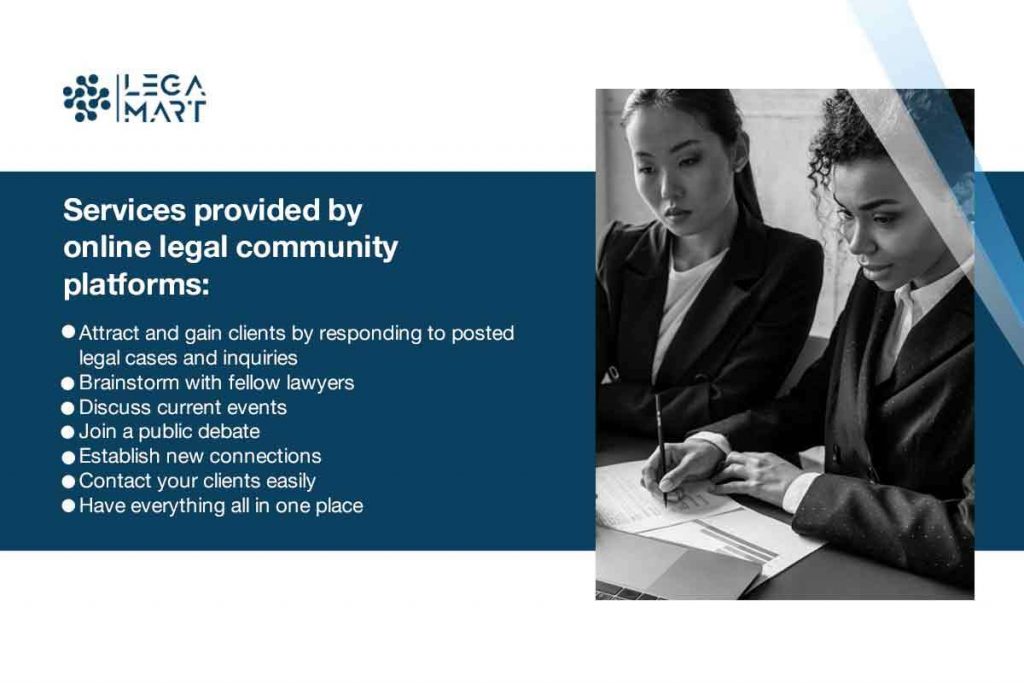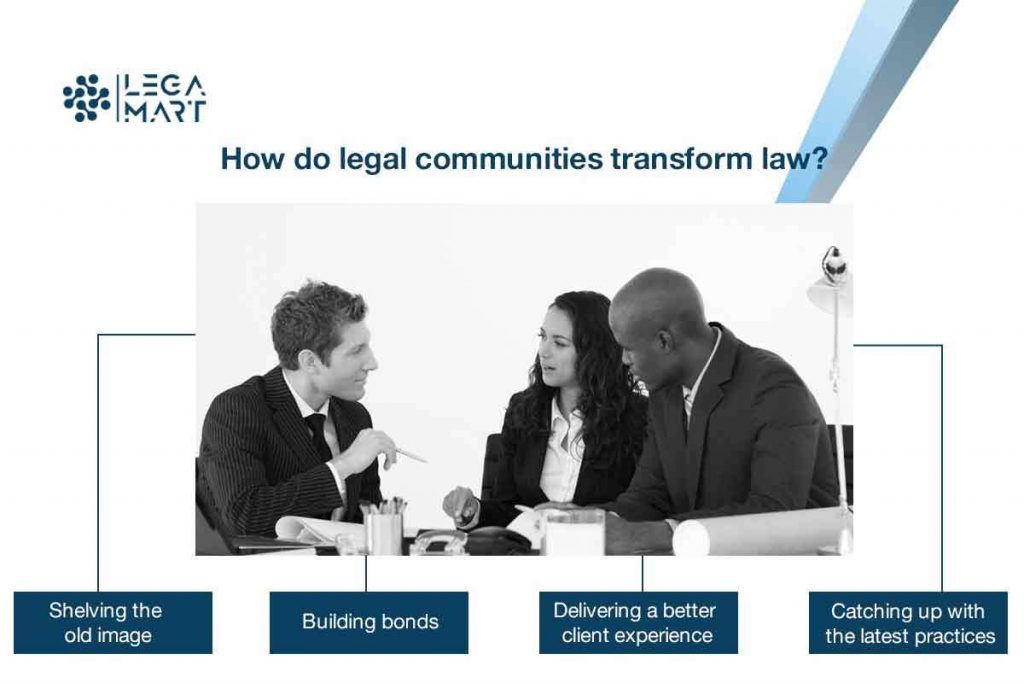- Introduction: Law is going digital
- Legal Platforms Can Organize Your Practice
- Legal Platforms Give You Access to an Ever-Growing Online Community of Lawyers
- Legal Communities Connect Lawyers with Potential Clients
- How are legal communities transforming law?
- Conclusion: Building Bonds within the Legal Community
- Frequently Asked Questions (FAQs)
Introduction: Law is going digital
With the ever-growing rise of technology worldwide, it is no surprise that legal communities have also gone digital. Though online legal community platforms are still relatively new, they are full of potential. From only a few hundred in 2018 to thousands today, they are becoming more prominent and available. Over time, that demand is only going to increase.

Previously, the primary focus of legal communities was one of several services. They were either communication platforms for lawyers to talk to other lawyers, search platforms for clients to find lawyers, or open communities that provided free Q&A forums. However, some platforms provide all these services and more – an all-inclusive experience in law. You can:
- Attract and gain clients by responding to posted legal cases and inquiries
- Brainstorm with fellow lawyers
- Discuss current events
- Join a public debate
- Establish new connections
- Contact your clients easily
- Have everything all in one place
Legal Platforms Can Organize Your Practice
Everyone knows that when your workspace is organized, so is your mind. When your mind is organized, you can be more efficient and more relaxed and, ultimately, get more work done. This can only happen, however, when everything is in one place.
Recently, more legal platforms have wanted to do just that for lawyers. They give attorneys an easy-to-use interface that allows them to keep everything that they could ever need in one place.
Legal communities provide a holistic environment where lawyers can easily fulfil their tasks. There is a personal dashboard available where lawyers can easily and securely store their documents and case files on a cloud. This way, they can all be accessible.
Regarding interactions with other skilled lawyers, there is an exclusive platform that allows connecting with thousands of other legal representatives. This is done privately through online community forums and posts. Then, there is also the opportunity to contact and interact with current and prospective clients. Lawyers can share information with their current clients while also having the chance to find potential cases.
Legal Platforms Give You Access to an Ever-Growing Online Community of Lawyers
One vital feature of any online platform is the opportunity to communicate with other lawyers regarding diverse topics. This is a way for legal community members to obtain knowledge and share their own.
Furthermore, due to the innate accessibility of the internet, lawyers have the opportunity to learn about foreign policies and laws. They can also pose questions about a case outside a lawyer’s jurisdiction or legal speciality. This is an easy way to promote professional development and better your practice.
Furthermore, through these legal communities, lawyers can form their network of fellow lawyers and clients. This forms professional connections that could eventually lead to two things. The first is a greater knowledge of their field.
Secondly, they can get potential client referrals through other community members. Finally, as everything today functions through connections, lawyers must grow a qualitative network of colleagues in times of inquiry or recommendation.
Legal Communities Connect Lawyers with Potential Clients
Legal platforms do not only offer a private side of online legal platforms concerning lawyer-to-lawyer interaction. There is also a public side that allows prospective clients to connect with lawyers suitable for their current case. This gives lawyers access to a broad client pool. This client pool even increases on legal platforms that offer international service through access to an international community.
By putting their profile on a legal platform, lawyers give potential clients access to their contact information and resumes. This means the possibility of finding a lawyer, even one in another jurisdiction, is higher than ever for clients. This, in turn, makes finding those clients easier for lawyers. This process facilitates professional growth and allows legal representatives to build upon and increase the clientele that they already have.
How are legal communities transforming law?

Online communities are capable of revolutionizing the law. While it is possible to start with scepticism, if the lawyers and the law firms take advantage of these opportunities and overcome the pitfalls, it can help bring your strategies and ideas to life. The following are some steps that you might face in the journey:
Shelving the old image
Many lawyers find it difficult to start with online legal communities, especially considering that the free-for-all platforms can bring amateurs and hobbyists into the picture and try to advise members of the public. There are further online marketplaces where lawyers compete for specific projects with limited budgets.
However, this image differs from what professional legal platforms try doing, especially those that aim to connect potential clients with legal experts. The new emerging platforms provide unconventional ways to build a community of lawyers: for instance, the new trend is the wall gardens that provide gathering places for qualified individuals in specific legal industries, such as compliance officers in pharmaceutical companies, project managers in the infrastructure sector, etc.
These communities act as online digital conference spaces wherein individuals come together and share the best practices, engage in discussions, provide legal insights, and try to advance the field they are associated with. While the start of these communities might have been with closed LinkedIn groups, WhatsApp chats, or even email addresses; however, they have now evolved into professional communities. This becomes the start of the many opportunities available today for lawyers.
Building Bonds
Companies and firms engaged in legal practice are also encouraged to join these communities. These platforms can provide them with potential customers who might be interested in emerging legal fields.
These platforms provide individuals and companies with the opportunity to build relationships, demonstrate expertise, and bring in potential clients.
However, the economies are not completely clear here. For example, it might be possible that the lawyers are volunteering a small proportion of their time to these platforms to build new business relationships and reputational capital. So, while these platforms might not be capable of generating direct income, they are capable of setting themselves apart in the market through the expertise, skills and knowledge available to them.
Deliver a better client experience
These online legal communities can also deliver better customer experience and helps to bridge the communication gaps between the law firm and the client. A recent survey by LexisNexis and the University of Cambridge has found “unambiguous evidence of a significant and persistent disconnect between law firms and their clients”, wherein about 25% of clients are thinking of shifting their business to in-house businesses rather than firms.
Further, additional concerns have been related to visibility, flexibility, and responsiveness with the firms. However, with the transitions made to online legal communities, the fully-fledged platforms exchange best practices, annotate legislation, engage with clients in real-time, along with providing the clients with a personalized experience.
In addition to this, this encourages the clients to provide them with high-quality and profitable strategic advice that is not provided on these platforms, hence, clearly indicating the competitive levels that these platforms have been able to generate.
Catch up with the latest evolving practices
Apart from the reasons already discussed above, the main reason firms should try to engage with these platforms is to catch up with the economic practices and the market directions. In law, there are other fields wherein industry professionals are starting digital platforms to share their knowledge and intellectual property, put aside the competition for the time being, and work collectively and lower costs.
While there have been discussions related to new technologies that might be capable of automating procedures, however. Currently, the more powerful tool is the technology that connects people and stakeholders in a common space. This is how the transition started.
Conclusion: Building Bonds within the Legal Community
With access to a limitless pool of knowledge, and the assurance of a private, secure workspace, it is easy to understand why legal community platforms are growing daily. As lawyers, our priority is to provide the best service for our clients, and it’s about time that the same was done for us. That is why legal platforms have been created. They strive to give a community not only to associates but one that forms a bond between legal colleagues worldwide.
One such platform is LegaMart which provides easily accessible information on diverse legal fields and a community of lawyers who are always available for all your legal queries. Access our directory and contact a lawyer today!
Frequently Asked Questions (FAQs)
How can legal platforms organize your practice?
Legal platforms give attorneys an easy-to-use interface that allows them to keep everything that they could ever need in one place. They provide a holistic environment where lawyers can easily fulfil their tasks. In addition, there is a personal dashboard available where lawyers can easily and securely store their documents and case files on a cloud. This way, they can all be accessible.
How can legal communities connect lawyers with potential clients?
By putting their profile on a legal platform, lawyers are giving potential clients access to their contact information and their resume. This means the possibility of finding a lawyer, even one in another jurisdiction, is higher than ever for clients. This, in turn, makes finding those clients easier for lawyers. This process facilitates professional growth and allows legal representatives to build upon and increase the clientele that they already have.





